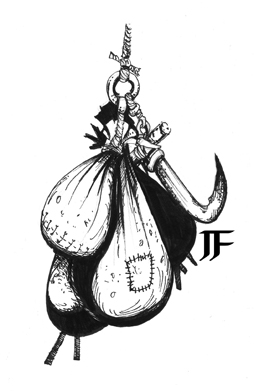Guilds in Blackfen
 Like most urban centers in Arrasia, Blackfen is dominated by Guilds who protect the interests of their members. There are nineteen Guilds in Blackfen, representing almost every kind of craft and profession. Guilds protect their members in a wide variety of ways, as well as offering them benefits. They also tightly and rigidly control the local market, maintaining prices and working practices that are beneficial to the Guild members and the profession as a whole. Some Guilds control the entire market and only members can practice their craft within the city, while others exert less control.
Like most urban centers in Arrasia, Blackfen is dominated by Guilds who protect the interests of their members. There are nineteen Guilds in Blackfen, representing almost every kind of craft and profession. Guilds protect their members in a wide variety of ways, as well as offering them benefits. They also tightly and rigidly control the local market, maintaining prices and working practices that are beneficial to the Guild members and the profession as a whole. Some Guilds control the entire market and only members can practice their craft within the city, while others exert less control.
The nieteen guilds are: the Apothecaries, Alchemist's and Arcanists Guild, the Architect's, Engineer's, Roofer's and Builder's Guild, the Breadmaker's and Baker's Guild, the Guild of Boatmakers, and Shipwrights, the Carpenter's, Joiner's, Coopers and Wood Workers Guild, the Cobbler's Guild, the Fishermen and Fishmonger's Guild, the Furriers, Falconers, Farriers, Hunters and Gamekeepers Guild, the Gravedigger and Undertaker's Guild, Heshog's Gladitorial School of the Stout Hearts (otherwise known as the Warrior's Guild), the Jeweler's and Gem Cutter's Guild, the Masons Guild, the Merchant's Guild, the Sailor's Guild, the Guild of Moneylenders, the Guild of Scribes, Scriveners, Arbitrators and Clerks, the Smith and Metal Monger's Guild, the Tailor, Weaver and Cloth Maker's Guild, and the Tanner's Guild.
Of this nineteen, the Apothecaries, Alchemist's and Arcanists Guild, the Breadmaker and Baker's Guild, the Jeweler's and Gem Cutter's Guild and the Sailor's Guild all require those undertaking these professions to be members of their Guild. For the Apothecaries and Alchemist's Guild and the Guild of Arcanists, membership is required through a City Council Proclamation and those practicing these professions illegally (that is, without Guild membership) face being arrested.
Guilds have a powerful influence over their area of control, irrespective of whether someone is a member or not, so for for the majority of individuals whose trade is governed by a Guild, it make sense to pay the fee to join, and at least have some input into the direction and governance. Joining a Guild has an annual fee. Most Guilds also usually allow temporary access to non-guild members to use the Guild's resources (such as a library), at their discretion, for a one off fee (though again, this varies from guild to guild). All trading is, however, still subject to the Guild Code of Practice.
As well as a fee, many Guild require its members to pass test or series of tests before joining, in order to show the necessary skill and ability at their craft or profession to be able to uphold the standards as laid out in the Guild Code of Practice. As such, anyone applying to become a Guild member must fulfill certain prerequisites in order to be accepted. These prerequisites define their rank within the Guild, as set out below:
Guild Members are broken into three ranks:
Apprentices: apprentices are not in fact full members of the Guild, but are trainees working for a tradesmen who is. They are represented in the Guild by their master and are allowed limited access to the Guild. There are no prerequisites to being an apprentice.
Journeymen: once a craftsman has finished their apprenticeship, they become a journeyman, who can become a full Guild member and start up their own businesses. Journeymen form the majority of a Guild's membership and represent the ordinary, everyday craftsmen.
Master Craftsmen: Highly skilled, these are the cream of their professions and are highly regarded, skilled, and paid. Only Master Craftsmen can sit on the Guild Council (usually decided through a members-only ballot). There are usually only one or two Master Craftsmen to any Guild.

